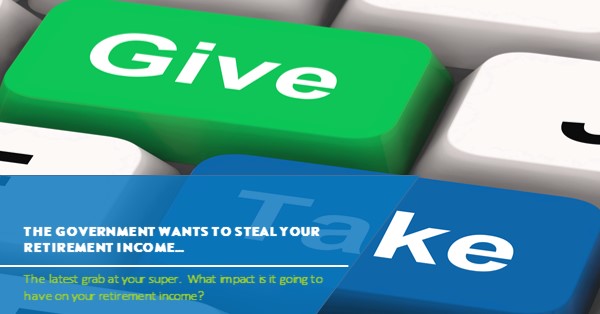
The government wants to STEAL your retirement income…
Not a year goes by where the government in some form want to wind back any benefits to do with building your own retirement fund.
I feel for everyone, I am finding people are losing confidence in the superannuation system every year, while it’s getting harder and harder to save for your retirement.
When you are older and have the ability to contribute, the government have reduced the ability to contribute and this is the time you are able to contribute more.
Building your retirement pool and planning how you are going to fund it means starting a lot younger. No longer can you leave it until the end of your working life.
And now we have Labor wanting another go at the people that have worked for their retirement and funded it themselves. Most are going to be impacted and most definitely most of my clients are going to lose out under these proposed changes.
Now, I’m not one for talking politics but in this case wanted to provide the information we have at hand to keep you informed of the proposed changes should Labor make it into power and it’s going to impact a lot of retirees and cut their income.
What is a franking credit refund?
For some, you may not know what a franking credit refund is and the potential impact these changes are going to have on you. It may be that at present this does not have any consequences for you, however as you approach and enter retirement I can tell you now, it’s going to make a difference.
If you hold Australian shares either in your own name or in super, they pay tax at a maximum tax rate of 30%. You receive what is called a franking credit that can either offset your tax payable whether in your own name or inside your super fund. Therefore you can potentially receive this franking credit back as a refund.
In retirement, if you run a Self Managed Super Fund (SMSF) and you are in receiving a pension(regular income) from your SMSF, your fund will not pay any tax on the income generated inside your SMSF. Therefore in most cases where there are Australian’s shares held, which most hold, under the proposed changes, if you are not in receipt of a government pension you will not receive any of the franking credits back.
This will effectively hit the income you are able to generate within your SMSF and ultimately the return you are able to generate.
For example, if you receive $50,000 income from Australian shares and let’s say in this example they are all fully franked (ie the Australian companies you own all pay tax at 30%), there would be franking credits to the value of $21,428. As the rules stand at present and provided the fund is 100% in pension phase you would be entitled to receive them as a refund back into the SMSF. Under the proposed changes you would not receive this franking credit back. You lose $21,428. See the impact this is going to have on your super…
What are the proposed changes?
For anyone who receives a franking credit refund. That is if you have investments in Australian shares and you receive a refund at tax time, you are in the firing line.
Labor is proposing that you not receive these refunds any longer. If you are due a refund based on a refund of franking credits, then you will no longer receive this.
Labor has recently carved out some concessions for those on government benefits, such as an age pension, which if you do receive a government pension you will be able to receive your refunds.
These changes are going to have a major impact on most retirees in the future.
Recent changes to the superannuation system and aged pension have led to more people being self-funded. That is they will not be able to rely on government pensions and thus need to rely on their own savings to fund their retirement.
Although there is a long way to go, for one thing, Labor needs to make it into power and second, they need to make it law and like most laws introduced there are many changes prior to it becoming law.
Who’s going to be impacted?
The main people in the firing line are those who have Self Managed Super Funds and those who hold Australian share portfolio’s in their own name where they are paying little to no tax on the income and receive refunds each year.
For most people who have taken the pro-active approach to managing their own super either on their own or with the help of an adviser may need to reconsider their strategy if these changes come into force in the next year or so. If these changes come into action, it is going to mean a large majority of SMSF’s paying pensions are going to lose a lot of the benefits such as increased income by holding Australian shares.
In reality, this is going to mean SMSF’s are going to be eating into their capital at a greater rate thus balances will decline at a faster rate.
If you hold an SMSF, you will need to reconsider whether an SMSF is the right structure for you and whether there are better structure’s out there for you.
If you hold Australian shares in your own name and not paying tax, you will also be impacted. Most retirees I look after have some form of Australian shares held in their own name and they will also be impacted.
It is uncertain at this stage if certain retail super funds will be impacted, ie where they receive franking credits back through their own account or not. More important than ever to keep abreast of the changes.
What are the options?
At this stage, it is worth noting what the proposed changes are, and be prepared if they come into force what your options are and what is the preferred structure based on your individual circumstances.
It is no better time to have an experienced adviser by your side to make informed decisions given the complexity of the super system and there are so many rules to get your head around.
It is worth noting that Labor, who is a big supporter of industry funds, due to the structure of those funds that they may, in fact, gain from these changes, that is it may be better to consider funds like this in the future, however like most things, do your homework to make sure it is the best way forward for you. There are many pros and cons that people don’t take into account and this could inadvertently cost you thousands of dollars over the years.
Like most things, we can only work with the information at hand. Super is still a great tool for building your retirement fund if you take advantage of all the incentives, although reduced over the last few years. However, this does mean you need to be more proactive with the management of your super if you are going to make it work for you.
It is more important than ever to have an experienced adviser by your side to assist in making the right decision based on your unique circumstances and needs. If you are someone who manages it yourself, make sure you are well informed and understand ho the changes will impact your circumstances.
Hope that helps.
If you feel someone would benefit from the information contained in this blog, do them a favour and feel free to send it on.
Make it a Great Life!
Glenn Doherty – CFP – Founder & Financial Organiser at Jigsaw Private Wealth

